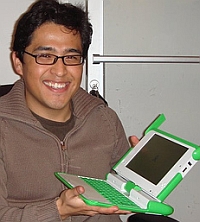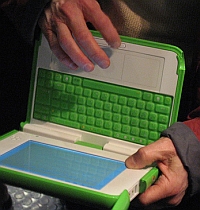I believe that the One Laptop Per Child educational initiative is poised to frame the discourse around educational technology and global youth media. The issues at stake lay at the crossroads of the purposeful use of technology in teaching and learning, and as a corollary, the role of multimedia and media literacy in education and instruction.
The OLPC laptop offers an incredible array of tools for teachers and researchers of youth media and media literacy. Beyond its utility as an e-book, a distribution channel, and a communications platform, each device is also a miniature multimedia production studio, with capabilities to capture (each laptop has a built-in camera and microphone), edit (the linux-based operating system will include editing software, and is also a general purpose operating system which can be easily extended), and play audio and video (the laptops will be internet connected, and have full-featured internet browsers).
Combined with their innovative mesh networking, these laptops have the potential to turn billions of the world’s youth into participants in the emerging networks of peer‑production, such as the Wikipedia, flickr, and YouTube. A digital content overload even. Nicholas Negroponte, the OLPC chairman, recounts that the first English word spoken by many children living in the third world is “Google.”
Through search and discovery, the OLPC laptop will expose the world to the full range of popular culture that the Internet offers - from popular music, images, and celebrities, to spam and porn. As educators and researchers we should be actively anticipating this platform and others like it, crafting curricular engagements that leverage and direct the educational power this torrent of media offers.
Many of the other presentations at Think, Teach, Play may actually find a home on the "$100 laptop", especially to the extent it provides multimedia editing tools, and perhaps more importantly, an internet-connected browser.
Lawrence Lessig has boldly asserted that text is becoming the Latin of our time, and audio and video the new vernacular. The freeculture movement is leading the struggle to reclaim popular culture as a read/write medium, as opposed to merely a read‑only one. Technologies such as the OLPC laptop present affordances to their users which shape their usage in practice.
The OLPC laptop’s affordances uniquely situate it at the frontier of free culture in ways that subvert traditional hierarchical authority and power relations. The project has been designed from the ground up to embody constructivist principles, and plans to activate the intrinsic curiosity of children who will learn by creating, publishing, and sharing. In this presentation we will explore how the design of this system and the ecology that produced it supports these objectives.
If you think the iPod is hot, just wait until these gadgets start rolling off the production lines and into the mainstream press. The OLPC laptop is about to become part of our global popular culture. Will we anticipate and plan for its arrival, or lament our neglect later?
There is still time to register for Popular Culture in the Classroom: "Teach, Think, Play" Conference 2007, March 24 & 25 at Teachers College in New York City. Please come on out and participate in this conversation - "Eighty percent of success is showing up."




> ...
This reads very rah-rah. Nothing much wrong with that, but it raises the same questions that have come up here many times before. Like ... if this constructionist business was such a great idea, why foist it on third-world people first? If really it is so anti-authoritarian or whatnot ("subvert traditional hierarchical authority"), why on earth would those hierarchical authorities pay for this? ... and so on.
> "Eighty percent of success is showing up."
In that case, one wonders about the overall scale of achievement of said success.
>> Nicholas Negroponte, the OLPC chairman, recounts that the first English word spoken by many children living in the third world is “Google.”
I can't believe you can say this with a straight face. While it is true that NN says variations of this regularly, this does not make it true.
I remain mystified as to why/how the OLPC guys get away with saying things like this unchallenged. Sometimes I assume that it is simply because statements like this are so obviously hyperbolic that it isn't worth anyone's times to point out how ridiculous they are. But then I read postings like this one and am reminded that most people seem to check their critical faculties at the door whenever they enter the OLPC reality distortion zone.
Hi Anonymous,
>> if this constructionist business was such a great idea, why foist it on third-world people first? If really it is so anti-authoritarian or whatnot ("subvert traditional hierarchical authority"), why on earth would those hierarchical authorities pay for this? ... and so on.
Well, I think there are technical, political, and economic explanations for why OLPC is focused on the third world. But perhaps it is worth wondering if the debate here could be generalized to enthusiasm for Web 2.0 in all of its manifestations (the "pornography of self" as FuriousSeasons calls it http://www.furiousseasons.com/archives/2006/12/love_american_style_web_20_and_narcissism_1.html). And for a very serious treatment of what's generally at stake here, we should probably be referring to Benkler's seminal work in this area (http://www.benkler.org/wealth_of_networks/index.php/Main_Page).
Society has looked expectantly to technology as savior dating back to the Greeks and Egyptians, and people talked about the freedoms and expansion of democracy that railroads and telegraphs would usher in with similar expectation.
Still, I would say that this post was more of a call to action than a "rah rah" cheerleading piece. I concur that the questions have been raised before, but I don't hear all the appropriate and affected communities chiming into the conversation. Where are the educators, media theorists, anthropologists, and cultural studies folks (never mind the teachers and users themselves)?
The disability rights movement has an appropriate mantra - "Nothing about us without us." How might we apply that standard to the OLPC effort?
Also, I think it is kinda important to document the "OLPC reality distortion zone." I didn't state the Negroponte quote as a fact, I merely attributed it to him. I actually think it is _not_ hyberbolic to claim that epistemology itself (namely what it is possible to know, and how we go about learning and knowing) is changing around us, in The Google Age, and there is strong theoretical work to support this. As a society we need to be grappling with the new kinds of literacy these transitions demand.
Follow-up - here is the OLPC presentation that I ultimately presented at the Teach, Think, Play Conference:
http://jonahboss.fastmail.fm/presentations/teach_think_play2007/html/ttp2007_olpc_bossewitch.html